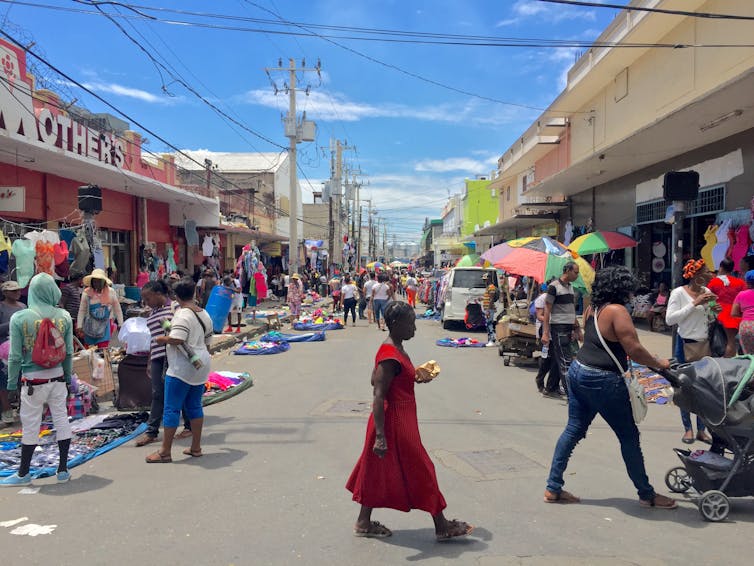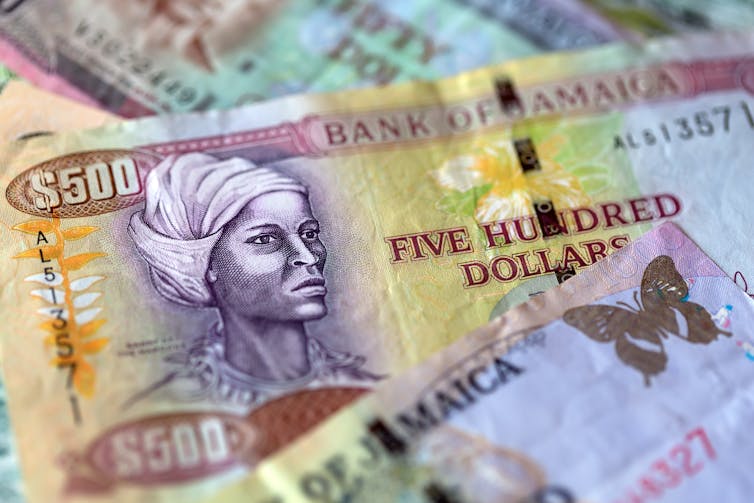
Margaret Byron, University of Leicester
For the second time in 2020, the media spotlight has fallen on the deportation of a group of men to Jamaica, many of whom had lived in Britain for a substantial part of their lives.
As with the Home Office’s deportation flight in February 2020, some of these men had been convicted of offences and had served sentences handed down by the British legal system. As Jamaican-born, “foreigners”, their status never allowed for redemption. Instead, the state’s decision to resort to deportation means they are punished twice: first, through a prison sentence, then, sometimes years later, through a sentence of exile and separation from their relatives, partners and children in Britain.
Despite legal challenges and campaigning, many of these people are forced into a return to a country they left in many cases over two decades ago, often as children. A country that had ceased, in most senses, to be home.
Read more: Windrush generation: the history of unbelonging
Several media outlets have used the term “foreign criminals” to describe these men. They take their cue from statements from the Home Office, which justify deportation as “public protection”. Their status as fathers, sons, brothers, as members of hardworking, loving, contributing communities is entirely absent from these hostile representations. The label “foreign criminal” denies their humanity and denies that they belong within the border. This one-dimensional idea travels with the deportees, further limiting their integration possibilities and life chances on their return to Jamaica.
Lack of transparency in decision making
If 37 of the 50 people deemed deportable by the state were removed from the cohort days, hours even, before the flight, it brings into question the very legality of the deportation process. Initial legal challenges against deportation were largely successful, yet the outcome was the same: a rushed removal process that failed to recognise the rights of the proposed deportees.

There was also talk of a quiet deal with the Jamaican government to exclude anyone from deportation who was under 12 years old when they came to the UK. The opacity of this decision and the apparently random limitation of “childhood” to under 12 years illustrates the inconsistency of these deportation decisions.
In a vulnerable place
Jamaica, like the rest of the Caribbean, is in many senses a migration-dependent society. Many decades of migration and remittances (money and goods sent home by migrants) have created an intolerance of empty-handed returnees. Success is measured in your ability to sustain your presence abroad and by extension, return must be a wealthy one.
Returnees, whether on a short or long-term basis, encounter expectant residents. Migrants are expected to return “with something tangible”, to be generous. At times this dissuades people from visiting as they feel unable to meet expectations. Narratives of “empty letter from foreign” are ubiquitous. Migrants who come back with “empty pockets” are seen as unwelcome, failures even.
The notion of the “foreign criminal” (widely circulated by the British state via the Home Office and in the British media) precedes the deportation flight, exacerbating the “cloud of fear and insecurity” created by existing high crime rates in Jamaica.
In their report for the Inter-American Development Bank, Anthony D. Harriott, professor of political sociology at the University of the West Indies and Marlyn Jones, criminal justice professor at California State University, Sacramento, note that homicide rates in Jamaica peaked in 2009 at 62 per 100,000, the sixth-highest rate in the world. After a decline in crime rates after 2009, the number of homicides increased between 2013 and 2017, according to the Statistical Institute of Jamaica.

In 2006, the late Jamaican scholar Professor Bernard Headley usefully contextualised the “deportee phenomenon” within the wider reality of increasingly high crime rates affecting Jamaican society. The associated “blame narrative” which dominated Jamaican media and official government statements at the time incorporated deportees, often without substantiation, as “an indistinguishable lot of ‘rejects’ sent back home to recreate for themselves disquieting, violent existences – in a land they departed years ago”.
Those issues still persist. Few in Jamaica would welcome arrivals with the “deportee” label. In a relatively small society, it is difficult to arrive discreetly. Rumours abound – and news of the deportation of “criminals from England” is likely to define the experience of the arrivals.
The majority of deportees are poor and do not have wealthy connections who could or would wield influence on their behalf in Jamaica. Funding to the National Organisation of Deported Migrants (NODM), the main source of support to deportees in Jamaica, has faced severe funding cuts over the past couple of years.
As Luke De Noronha, the Simon Research Fellow at the University of Manchester, wrote in his 2019 paper, Deportation, racism and multi-status Britain: immigration control and the production of race in the present, support from local charities is critical to the survival of returnees. But, according to research published in 2010 by Christopher A D Charles, a professor in political and social psychology at the University of the West Indies, a combination of displacement from their home and family in Britain, few relatives in Jamaica combined with hostility from the local state and society given the deportation process and the “criminal” label leaves deportees with few options.
Though relatives and friends can be helpful in some deportees’ experiences, long term, the outlook is not good. Deportees tend to survive on financial help from relatives in the UK, while being painfully aware of the increased pressure on those family members in Britain, as well as their own failure to provide. Communication is difficult as telephone and internet charges are more expensive and face-to-face contact is limited. Visits from Britain seem impossibly expensive. The resulting transnational households, stretched across international borders, are fragile.
With these issues to contend with – and at this particularly cruel time of COVID-19 in Britain and Jamaica – the ability to help a deported partner, parent or relative is severely reduced.
Margaret Byron, Associate Profesor in Human Geography, University of Leicester
This article is republished from The Conversation under a Creative Commons license. Read the original article.

